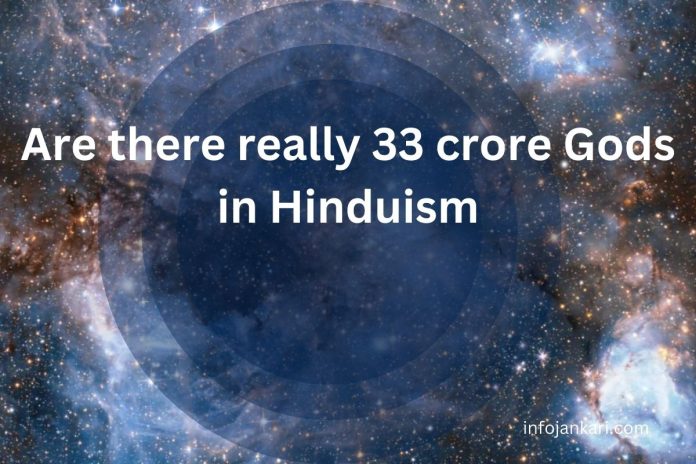33 Koti Devta: In Hinduism, there are many deities who are revered and worshipped, and the specific number of deities may vary depending on various interpretations and traditions within the religion. The most widely worshipped deities in Hinduism include Brahma, Vishnu, and Shiva, collectively known as the Trimurti. Other popular deities include Ganesha, Hanuman, Durga, Kali, Lakshmi and Saraswati.
Meaning of 33 Koti Devta
33 Koti Devta or 33 crore Gods in Hinduism?
A common misconception about Hinduism is that there are 33 crore gods. In fact, 33 crore deities (33 gods) are mentioned in the Vedas. The meaning of this word has been derived in two ways by religious teachers and many scholars. The word “Koti” in Devabhasha Sanskrit has two meanings: “crore” and “category” or “kind”. From a logical point of view, the second explanation of the Koti – that is, thirty-three different categories of gods and goddesses seem to be more appropriate on the subject. Nevertheless, depending on the understanding and intelligence of each individual, the interpretation, meaning and, most importantly, beliefs of the word changed.
It is important to note that Hinduism is a complex and diverse religion with many different beliefs, practices and traditions. While the number 33 koti is often used in religious texts and stories, it is not an accurate or literal count of the number of deities in Hinduism.
Who is called a Devta (deity)?
Deity is derived from the Sanskrit word div dhatu, which means “divine being”. Dev Bhavana means the representation of a supernatural power that is always working for the betterment of the world. For such men, the word Devta or Dev is used and for such women Devi.
The simple meaning of deity is the giver. That means the one who gives is God. That’s why in our society, the word deity is used for the good people who want the welfare of all.
33 Koti Devta Names in Hindu
If Vedic experts are to be believed, then there are 33 types of deities in Sanatan Dharma. Among them, there are twelve Adityas, eleven Rudras, eight Vasus and two Ashwani Kumars.
In this way, here are the main 33 gods: –
12 Aditya – Who is Aditya? What does Aditya mean in Hinduism?
In common language, Aditya means Sun. However, according to the Vedas, ‘Adityah Aptyam Puman Adityah’ means the sons of Brahma Shakti Aditi should be called Aditya. Goddess Aditi had twelve sons who are called 12 Adityas and come in the category of deities.
- Anshuman
- Aryaman
- Indra
- Twashta
- Dhata
- Parjanya
- Pusha
- Bhag
- Mitra
- Varun
- Vivaswan
- Vishnu
8 Vasu – Who are Vasus in Hinduism
Vasu means ‘one who dwells’ or ‘resident’. The eight Vasu deities are the ones who make people fat, that is, they are the ones who hold or maintain them.
- Aap
- Dhruva
- Som
- Dhar
- Anil
- Anal
- Pratyush
- Prabhash
11 Rudra – Rudra in Hinduism
The literal meaning of Rudra is the one who makes us cry. According to the Vamana Purana, the 11 Rudras are said to be the sons of Kashyapa and Surabhi and they are said to be incarnations of Lord Shiva.
The Upanishads refer to the 10 senses and 1 mind together as the “Eleven Rudras”, but these Rudras or the eleven Pranas are spiritual. One who manages these eleven pranas through the practice of yoga and a moderate diet finds contentment. If even one of these prana gets spoiled, then they make the living being cry, hence they are called Rudra.
- Shambhu
- Pinaki
- Girish
- Sthanu
- Bharga
- Bhava
- Sadashiva
- Shiva
- Har
- Sharva
- Kapali
The names of eleven Rudras have come in this way in Shrimad Bhagwat.
- Manyu
- Manu
- Mahinas
- Mahan
- Shiva
- Ritadhwaj
- Ugrareta
- Bhava
- Kal
- Vamdeva
- Dhritvrata
2 Ashwini Kumar
- Nastya and
- Dstra.
Some scholars place Indra and Prajapati instead of 2 Ashwini Kumars.
Read Also: Moksha To The Departed Soul or Rest In Peace (RIP)



